A COMMUNIQUE ISSUED AT THE NATIONAL POLICY DIALOGUE ON THE ROLE OF WOMEN IN THE DEVELOPMENT OF THE SOLID MINERAL SECTOR IN NIGERIA HELD AT BROADFIELD HOTEL, ABUJA, OCTOBER 12 & 13, 2022

A National Policy Dialogue on the Role of Women in the Development of the Solid Mineral Sector in Nigeria was convened by Women in Mining (WIMIN). The project titled: Mainstreaming Gender in the Solid Mineral Sector in Nigeria which is implemented in Ebonyi, Edo, Osun, Plateau, and Taraba States; is supported by the Open Society Initiative for West Africa (OSIWA) and Ford Foundation.
The programme, held at Broadfield Hotel, Abuja, October 12 & 13, 2022 was attended by over 80 participants drawn from State Chapters of WIMIN, CSOs, Ministry of Mines and Steel Development, National Environmental Regulations Enforcement Agency (NESREA), National Human Rights Commission, and the Media. At the occasion, there were series of presentations chief among which is: Mainstreaming Gender in Nigeria Solid Mineral Sector: An Overview. These were followed by a robust interactive and experience-sharing session. At the close of the meeting, participants identified some key issues and further proffered suggestions on the way forward as below:
THE ISSUES IDENTIFIED
1. There are huge untapped resources in the solid mineral sector with the potential to revamp Nigeria’s ailing economy and place it on the road to prosperity; if this is well explored, government do not need to go borrowing to finance its annual budget.
2. Although there are legal frameworks like the Constitution of the Federal Republic of Nigeria, Child Rights Acts, among others which ought to protect children in mining environment; it is common to still find children in numerous mining sites across different States in Nigeria.
3. Women are more on the receiving end of the discrimination, social injustice and the negative environmental effects such as poor working condition, environmental pollution, disproportional pay and exploitation inherent in the mining sector.
4. There are deep concerns over the need for equity, access and welfare among operating stakeholders in the sector as women miners seem not to be adequately protected against major investors that have the financial power to chase them out of the business.
5. There are observed unexplainable delays in the issuance of licence to Artisanal Miners especially the women folks by the Federal Issuing Authority. This has the tendency to slow down the development of the sector
6. The Solid Minerals sector in Nigeria is gender blind and perceived to be male dominate; unfortunately, it is one industry that has promoted exclusion, exploitation, and human rights abuses in Nigeria where women are at the receiving end.
7. In spite of the contribution of women to the development of the Solid Mineral sector in Nigeria, a recent report from NEITI has it that women occupy only 3.5 percent of the 5,820 jobs available in 29 companies in 2020 while the remaining 96.5 percent were occupied by men.
8. The level of collaboration and cooperation amongst relevant government agencies and stakeholders seems not to be deep enough as some agencies are in the habit of working in silos which impedes the achievement of the corporate objective and vision of the mining sector.
9. There is weak industry regulation leading to all sorts of sharp practices and unprofessional conducts in mining sites that are not likely to promote gender equity and development of the sector.
2. Governments, CSOs and other stakeholders should work together to enforce the provisions of the various frameworks to ensure that children are protected from the dangers of mining environment.
3. Policies/laws that limit or prohibit the participation of women in any form within the Solid Minerals sector should be reviewed to promote gender inclusion and women participation in the sector.
4. Conditions to facilitate easy access of women miners to the N5billion funding opportunity domiciled with the Bank of Industry should be considered by the Federal Government to make them competitive and relevant in the industry.
5. The Federal Issuing Authority should as a matter of urgency review its processes and operations with a view to reducing the unexplainable delays in the issuance of mining licence to Artisanal Miners especially the women folks.
6. To promote inclusiveness and faster development of the Solid Minerals sector, government should consider moving solid minerals mining from ‘exclusive’ to ‘concurrent’ list.
7. There is need for increased collaboration, networking and cooperation among relevant government MDAs and CSOs working in the Solid Minerals sector to address inherent gender imbalances and promote the development of Solid Minerals sector in Nigeria.
8. Government through the MMSD should consider the establishment of Mining Service Centres across the senatorial districts or LGAs to strengthen the monitoring and regulation of artisanal mining activities.
CONCLUSION
Participants at the meeting were resolute and determined to work together towards the mainstreaming of gender, and the development of the sector. They also pledged to use the above recommendations to engage relevant stakeholders towards mainstreaming gender in the Solid Minerals sector in Nigeria for the development of the sector.
SIGNED
###